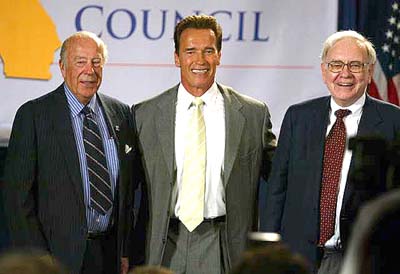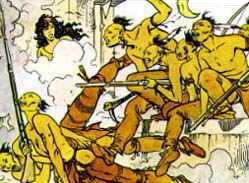 Another Stereotype of the Month entry:
Another Stereotype of the Month entry:
 Another Stereotype of the Month entry:
Another Stereotype of the Month entry:
POLITICAL CAPITAL
By ALAN MURRAY
Schwarzenegger Has One Useful Idea: Tap Casino Money
WASHINGTON — An analysis of Arnold Schwarzenegger's 10-step PowerPoint plan for turning California around has led me to the conclusion that the governor-elect subscribes to the philosophy once articulated by the late Sen. Russell Long of Louisiana:
"Don't tax you, don't tax me. Tax that fellow behind the tree."
Mr. Schwarzenegger, who once starred in a cowboy movie with Kirk Douglas and Ann-Margret called "The Villain," has found the man behind the tree. It turns out to be an Indian.
Several of the governor-elect's 10 steps — "repeal the car tax," "pass a jobs package," "put more money into the classroom" — would actually increase the state's budget deficit. Others — "audit the budget," "renegotiate state employee union contracts," "streamline bureaucracy" — are such vague and fuzzy deficit-cutting notions as to be almost meaningless.
But one, and only one, of his 10 steps could make a clear, and sizable, dent in the deficit. It is step four: "Get our fair share of Indian gaming revenue."
Mr. Schwarzenegger wants the state to take 25% of all the gambling profits of its American Indian tribes — the same percentage paid by Connecticut tribes to their state. That is big money. The 40 or so tribes now operating casinos in California pay the state a paltry $140 million a year, but have profits estimated at about $5 billion — more than half as much as the profits of all the casinos in Nevada. The Schwarzenegger proposal would net the state $1.25 billion or more a year.
The problem is that American Indians don't pay taxes. They live in autonomous regions, yet can vote in U.S. elections. And even more importantly, they can lobby and make campaign contributions — something they have done prodigiously in recent years.
In the past decade, newly enriched Indian tribes have become power players at both the state- and federal-government levels. At first, they contributed mostly to Democrats. But more recently, prodded by the likes of Washington superlobbyist Jack Abramoff, the tribes with casinos have contributed heavily to Republicans, too.
In California, the Native Americans may have flexed their new political muscle a little too well. They were the biggest money players in the recall effort, contributing $11 million — more money than any other interest group. They attacked Mr. Schwarzenegger from both sides, giving roughly $8 million to Democratic Lt. Gov. Cruz Bustamante, and another $3 million to antitax conservative Sen. Tom McClintock.
In addition, the tribes engaged in head-on combat with Mr. Schwarzenegger, running ads to counter his, on the Indian gambling proposal. He accused the tribes of playing "money politics in Sacramento," contributing $120 million to politicians in the past five years. The tribes struck back with ads saying gambling has put them "on the road to self-reliance, with a brighter future for our children. ... We're thankful to leaders like Cruz Bustamante and Tom McClintock, who listened to our plight and helped us."
If this were a movie, Mr. Schwarzenegger now would march into the casinos and demand his share of the cash. As governor, however, he will find it more difficult, because his predecessor — who, by the way, received more than $1 million of campaign contributions from the tribes — signed 20-year agreements granting 61 tribes a gambling monopoly and getting little in return. And Mr. Schwarzenegger may find it impossible to reopen these sweet deals.
"Gray Davis gave away the store," says I. Nelson Rose, a professor at Whittier Law School in Costa Mesa, Calif., and an expert in gambling law. "He negotiated a terrible agreement." The new governor's only hope may lie in negotiating better deals with the 30-some tribes still waiting to get their casinos approved.
The Indians hate being portrayed as a "special interest," and talk about their tax status as if it is reparations for centuries of mistreatment. But Indian gambling is immensely profitable only because the people of California have granted the tribes a monopoly. If the state followed the path suggested by another gubernatorial candidate, pornographer Larry Flynt, they could legalize slot machines across the state, bring in plenty of revenue and corral a sizable share of the tribes' take.
The California tribes, with their untaxed billions, may have the political clout to stop the Terminator. But Mr. Schwarzenegger is right on this one. The tribal casinos shouldn't be allowed to wield enormous political influence on the one hand, while claiming sovereign exemption from taxation on the other. They ought to pay their fair share of the financial costs of a state that they try so hard to control politically.
Or to put it another way: No representation without taxation.
Write to Alan Murray at alan.murray@wsj.com

Indian Country Today responds
Beware the anti-Indian media message: A twisted story can become legend
Posted: October 17, 2003 -- 1:34pm EST
Now comes Allan Murray, normally among the more thoughtful of the conservative commentators, taking his shot at the Indian story. Darn if it doesn't replicate the hardening mold. Writing in The Wall Street Journal, Murray dismisses all of Arnold's ideas for reducing California's deficit, "[b]ut one, [it] is step four: Get our fair share of Indian gaming revenue." (WSJ, October 14, "Schwarzenegger Has One Useful Idea: Tap Casino Money"). Every other Arnold idea turns out to be "vague," "fuzzy," "meaningless," except taxing the Indian revenues from tribal gaming. "The Villain," behind the tree," writes Murray, playing on the title of an early Arnold movie, "turns out to be an Indian."
Why must it be so?
Because, "American Indians don't pay taxes. They live in autonomous regions."
(Actually, Indian governments don't pay taxes. Indian individual workers certainly do. So do those who receive per capita payments derived from gaming revenues. And, they happen to live all over the country.)
The effort by tribes to defend the Indian position on the issues, after a relentless attack by the Schwarzenegger machine, Murray refers to as the "Blah, blah of the Indian ads." So much then, from this attitude about anything any Indian leader may say. Over and out. Blah, blah. How is this fair and balanced?
Murray rounds out the article with a continued attack on the tribes' relationship with ousted Governor Davis, accusing the tribes of buying Davis with a $1 million campaign contribution. Again, the bogus assertion is of something dishonest being done by the tribes, who in contributing to politicians are in fact working within the system as well as they can, just like everyone else in the country. They get labeled as an interest group but in fact the "so-called" interest group syndrome is basically the country's political system. What Murray calls a "sweet deal" compacts for the tribes were the result of pretty tough bargaining, from a governor who understood that the tribes come backed up with a federally-recognized jurisdiction and governmental sovereignty based on 200 years of agreements, litigation, legislation and continuous case law. Which is entirely proper, because this is the actual history and the only logical positions of Indian tribal nations in this country.
As with other commentators addressing the Indian economic movement and its freedom from states, Murray appears to have constructed a derivative description of Indian nations taken mostly from other media assumptions and misrepresented accounts. While the depth of the American Indian tribal government construct in American legality is sound, this reality is out of sight and out of mind in the Murray prescription for Indian self-government.
Perhaps the smell of an organized campaign to argue down and limit American Indian tribal rights is not quite pungent, but there is a whiff. For now, media herding instincts or pack mentality does a pretty good job of it. Respected journalists like Murray owe it to themselves to delve deeper into the vision and mission of Indian tribal government, across the northern hemisphere. We encourage such journalists not to gloss over on this one, so to better understand realities often all too quickly assumed to be mastered.

Rob's reply
Murray didn't exactly say so, but he strongly implied Indians weren't just the "fellow" or "man" behind the tree, but the "villain" behind the tree. This plays on the centuries-old stereotype of Indians as savage killers lurking behind every tree and rock. It's a nasty implication.
Indians aren't people trying to better themselves by playing according to society's rules, according to Murray. They're transgressors who are somehow cheating or abusing the system. Even though the Indian Gaming Regulatory Act legalized Indian gaming to redress past injustices, Murray blames Indians for the results. He suggests Indians are wrong to use the tools Congress gave them as Congress intended.
Indian Country Today did a pretty good job of rebutting Murray. A few additional comments:
>> The problem is that American Indians don't pay taxes. <<
No, the problem is the stupid, false demagoguery inherent in statements like this. Tribes that run casinos don't pay taxes because they're governments just like states. Nevada doesn't pay taxes on its casinos to California and neither does Pechanga or San Manuel or Viejas. Individual Indians do pay taxes to California.
>> He accused the tribes of playing "money politics in Sacramento," contributing $120 million to politicians in the past five years. <<
He accused them of that, but he was wrong.
>> The Indians hate being portrayed as a "special interest," and talk about their tax status as if it is reparations for centuries of mistreatment. But Indian gambling is immensely profitable only because the people of California have granted the tribes a monopoly. <<
Murray's second statement here is a non sequitur. How "immensely profitable" Indian gaming is has nothing to do with the Indians' tax status. As ICT points out, Indian tribes are governments and are thus exempt from state taxation. This has been true for decades, long before gaming was an issue.
To help Murray with his logic, here's the missing third statement in his sequence: "The people of California have granted the tribes a monopoly as if it is reparations for centuries of mistreatment." This is in accord with the Indian Gaming Regulatory Act, which says states can't demand fees simply for letting tribes conduct gaming. They have to give tribes some extra consideration, such as a so-called monopoly.
Assuming California's voters did grant tribes a monopoly, the obvious rejoinder is "so what?" What is Murray's point, exactly? That Californians don't have the democratic right to vote as they wish? That they can't make up for centuries of mistreating Indians if they want to?
The people of California spoke by passing Propositions 5 and 1A. Who is Murray to say they were wrong? If he doesn't like the results of a democratic election, he's living in the wrong country. He should get out and find a place more to his liking.
>> If the state followed the path suggested by another gubernatorial candidate, pornographer Larry Flynt, they could legalize slot machines across the state, bring in plenty of revenue and corral a sizable share of the tribes' take. <<
So let California do that. Who's stopping it? Until it does, though, Murray's complaints are invalid.
Related links
The Wall Street Journal's hatchet job on Indians
Too-powerful Indians
The facts about Indian gaming
The essential facts about Indians today
|
. . . |

|
All material © copyright its original owners, except where noted.
Original text and pictures © copyright 2007 by Robert Schmidt.
Copyrighted material is posted under the Fair Use provision of the Copyright Act,
which allows copying for nonprofit educational uses including criticism and commentary.
Comments sent to the publisher become the property of Blue Corn Comics
and may be used in other postings without permission.